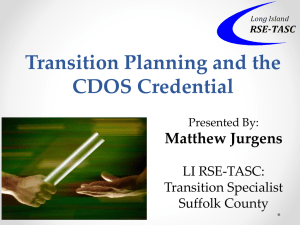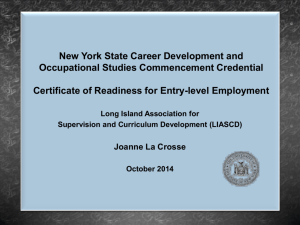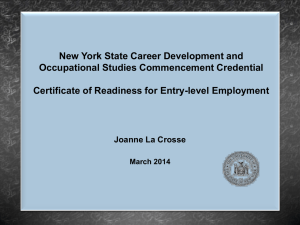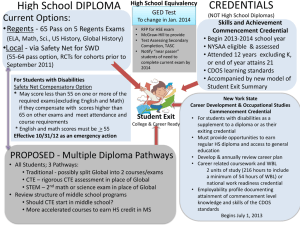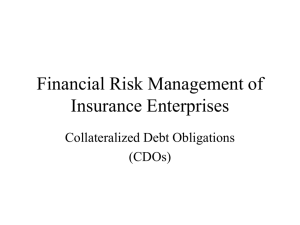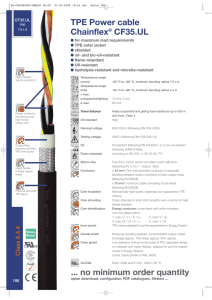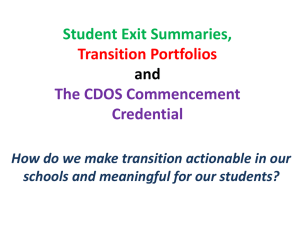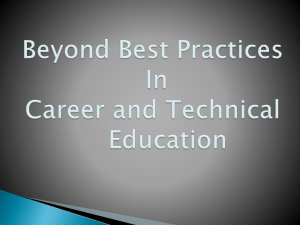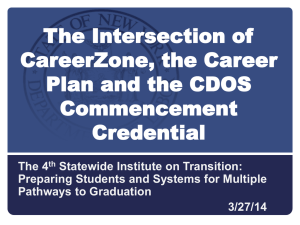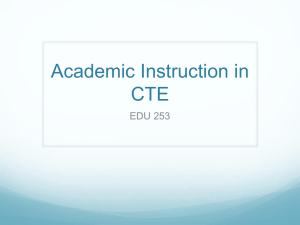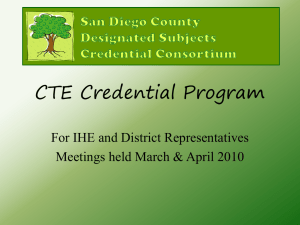CDOS Commencement Crendential
advertisement
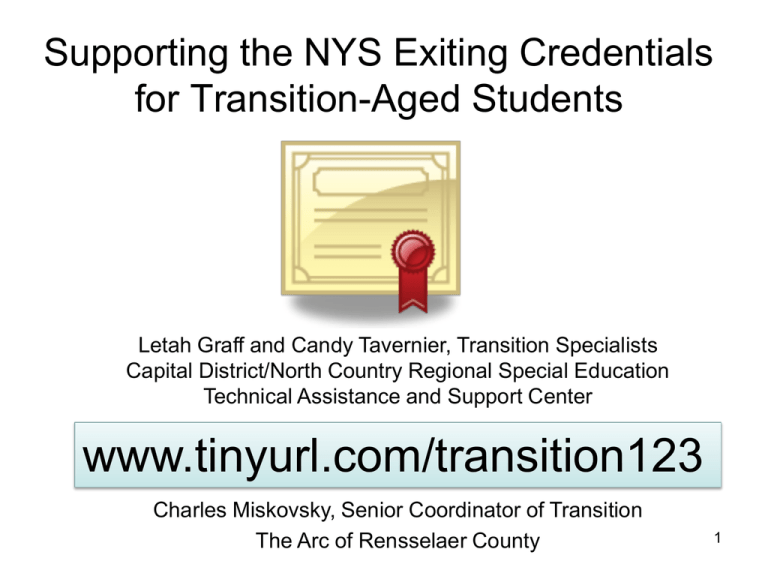
Supporting the NYS Exiting Credentials for Transition-Aged Students Letah Graff and Candy Tavernier, Transition Specialists Capital District/North Country Regional Special Education Technical Assistance and Support Center www.tinyurl.com/transition123 Charles Miskovsky, Senior Coordinator of Transition The Arc of Rensselaer County 1 1. Skills and Achievement Commencement Credential and 2. Career Development and Occupational Studies (CDOS) Commencement Credential • Become effective with 2013-2014 school year • No IEP diploma is available on or after July 1, 2013 2 NYSAA Students exit with a SKILLS AND ACHIEVMENT COMMENCEMENT CREDENTIAL Who Is Eligible To Take The New York State Alternate Assessment? Students who: • Have severe cognitive disability… and • require highly specialized educational program… and • require educational support systems… 3 Definition Students With Severe Disabilities Students HAS NOT CHANGED!! – with limited cognitive abilities combined with behavioral and/or physical limitations – who require highly specialized education, social, psychological and medical services in order to maximize their full potential for self-fulfillment and meaningful participation in society. – who may experience significant speech, language, and/or perceptual-cognitive impairments – who may have challenging behaviors that interfere with learning and socialization opportunities – may also have extremely fragile physiological conditions and may require personal care, physical/verbal supports and assistive technology devices. Intellectually Disabled, Multiply Disabled, Autism, Traumatic Brain Injury, Deaf/Blind What is the Purpose of the SKILLS CREDENTIAL? • Emphasize curriculum and instruction related to CDOS Learning Standards • Promote learning and work-based experiences to support functional, basic academic and career skills • Provide documentation of a student’s strengths, independence and level of skill achievement • Improve post-secondary outcomes for students with disabilities 5 What Is The Student Exit Summary for Students Obtaining a Skills Credential? A Document that must be completed before they exit school that: • Describes student’s strength and interests, achievements and accomplishments • Indicates student’s academic skills as measured by NYSAA • Indicates student’s level of achievement and independence for CDOS Learning Standards 6 NYS Career Development and Occupational Studies (CDOS) Commencement Credential • Certificate, not a diploma • Recognition of student’s preparation for entry-level employment • Students must still be provided with opportunities to earn a Regents or local high school diploma – Meaningful access to participate and progress in the general curriculum 7 NYS Career Development and Occupational Studies (CDOS) Commencement Credential • Supplement to a Local or Regents Diploma (students with disabilities only) OR • Exiting credential For a student with a disability who is unable to earn a regular diploma and is not taught/assessed on NYSAA With exiting credential, parent must receive written notice that the student is still eligible for a free appropriate public education (FAPE) until he/she earns a Regents or local high school diploma or until the end of the school year in which the student turns age 21, whichever comes first 8 NYS CDOS Credential – Option #1 Instruction, Coursework and Work-based Learning Meaningful access to participate and progress in general education curriculum (opportunities to earn a HS diploma) CDOS Learning Standards Equivalent of 2 units of study in CTE and/or WBL (at least 54 of the 216 hours must be WBL) Documentation Requirements Commencement Level Career Plan Employability Profile Documentation: The Career Plan 1. Student Developed 2. Annually reviewed, and as appropriate revised 3. Ensure active engagement in career exploration Includes but not limited to: Student-identified career interests Career related strengths and needs Career goals Career and technical coursework and workbased learning experiences 10 www.p12.nysed.gov/cte/careerplan 11 CAREER ZONE http://www.careerzone.ny.gov 12 Developing the Career Plan How can Agencies support schools to complete the Career Plan? – – – – – Interest Inventories Transition Assessments Work Based Learning Assessments Person Centered Transition Planning OTHER IDEAS 13 Job-site Assessment Name: Assessment site and location: Job title: Site contact & title: Assessment dates: Total Hours: Employment Specialist: Rating Scale: 0. Cannot complete task 1. Needs hands on instruction to complete task 2. Needs verbal prompts throughout the task to complete 3. Needs verbal prompts, but performs independently once started 4. Performs accurately without coaching (meets employer standards) Not observed Job Task/Work Skill Rating Developed by the Northeast ARC Collaborative Special thanks to Gretchen Lesson 1. 2. 3. 4. 5. 6. Attendance 7. Job Knowledge 8. Responsibility 9. Organization of Work Materials 10. Time Management 11. Quality of Work 12. Response to Supervision 13. Teamwork 14. Interpersonal Skills 15. Level of Independence 16 .Initiative 17. Flexibility 18. Stability 19. Work Ethic/Professionalism 20. Courtesy Based on the results of this situational assessment: 1. Does the student wish to pursue employment in this area? Yes No Unsure 2. Would you recommend that the student pursue this type of job? Yes No a. If yes, what supportive services and/or accommodations would you recommend: Job coaching Skill training Travel training Work behavior training Social skill training Employer/co-worker training and support Accommodations: b. If no, identify the factors or issues that render this type of work inappropriate: c. What additional supports or training could benefit: Comments Developing the Career Plan Questions about the Career Plan 16 CDOS Instruction and Skills Career Development and Occupational Studies • Part of NY STATE Learning Standards • Not just a special education initiative– for ALL students • Should be integrated into instruction in ALL CLASSES • 3 Levels (elementary, intermediate, commencement) 17 CAREER DEVELOPMENT knowledge CDOS Standard 1 Self-knowledge Who am I? Career exploration Where am I going? Career Plan How do I get there? INTEGRATED LEARNING What am I learning? Why am I learning it? How can I use it? application UNIVERSAL FOUNDATION SKILLS (SCANS) What do I need to know? What skills are CDOS Standard 2 Questions students should be able to answer important for me? skills CDOS Standard 3A CDOS learning standards 18 http://www.p12.nysed.gov/cte/cdlearn/documents/cdoslea.pdf 1. Career Development: Commencement Level STANDARD Students will be knowledgeable about the world of work, explore careers and relate personal skills, aptitudes, and abilities to future career decisions. Performance Indicators Complete Career Plan to permit entry into career of interest This is evident when students Develop resumes, letters of application Design a plan containing steps to attain goal Analyze job skills and relate to your skills Research a job including job requirements 2. Integrated Learning: Commencement Level Performance Indicators STANDARD Students will demonstrate how academic knowledge and skills are applied in the workplace and other settings. Use academic skills/knowledge in an occupational context Analyze skills and Demonstrate abilities required application of skills in in a career and school learning, work relate to own skills and personal lives and abilities This is evident when students Read job descriptions to identify application of academic and technical skills and job outlook Use effective skills in a simulated job interview Complete an internship and do presentation on skills required Thinking Skills Basic Skills Can Read Can Write Perform Math Functions Listens Effectively Speaks Clearly Can Think Creatively Uses Decision Making Skills Thinking Leads to Problem Solving Knows How to Learn Applies Knowledge to New Situations Technology Selects /Applies Technology Maintains Equipment Designs and Creates To Meet Needs Interpersonal Skills Teaches Others Serves Clients Exercises Leadership Negotiates/Communicates Works as a Member of a Team Works with Diversity CDOS Standard 3A Universal Foundation Skills Managing Resources Managing Information Acquires and Evaluates Information Organizes/Maintains Information Interprets/Communicates Information Uses Computers to Enter, Modify, Retrieve and Store Data Understands how to use: Materials Facilities Time Money Human Resources Networking Systems Improves & Designs Systems Monitors & Corrects Performances Understands How Systems Perform Related to Goals, Resources and Organizational Function Personal Qualities Demonstrates: Responsibility Ability to Plan Ability to Take Independent Action Integrity/Honesty Self-determination and ability to self-evaluate knowledge, skills and abilities 20 Supporting CDOS Learning Standards Look at the CDOS Learning Standards Examples Brain Storm and Shout Out…. 1. Take 60 seconds to brain storm your ideas about how you can help students to meet the CDOS Standards? 2. Turn to a colleague and combine your ideas. 3. Shout Out - What are your ideas and off the wall thoughts about how you can help students to meet the CDOS Standards? 21 NYS Career Development and Occupational Studies (CDOS) Commencement Credential Student will successfully complete not less than the equivalent of 2 units of study in: – Career and technical education course(s) and/or – Work-based learning experiences Minimum of 54 hours of documented, school supervised WBLE 22 Registered Work-Based Learning Programs Career Exploration Internship Program (CEIP) • School-business partnership initiative • Non-paid, on-site, career exploration experiences • Elective credit Cooperative CTE Work Experience Program (CO-OP) • 150 to 600 hours paid or unpaid skill specific experience, • Supported by related in-school instruction in specific CTE discipline & supervised by school • Can award credit General Education Work Experience Program(GEWEP) • Career awareness program for students age 16 and above; 150 to 600 hours paid, schoolsupervised work experience • Supported by related in-school instruction in specific CTE discipline & provides elective credit Work Experience and Career Exploration * Paid experiences Program (WECEP) • Similar in design and operation as the General Education Work Experience Program, but for atrisk students age 14-15 • Provided by local district for elective credit http://www.p12.nysed.gov/cte/wbl/home.html Memo June 2013 – Attachment 3 Other (Nonregistered) Work Based Learning Options Community Based Work Programs Job Shadowing Community Service • Observation of work environment • Exposure to jobs and careers • Participate in volunteer experiences to learn responsibility • Learn about community and needs of others Service Learning Senior Projects School-based Enterprise • Students with disabilities work in the community • Helps students identify career interests, assess their skills and training needs • Develop employment skills and work habits • Integrated classroom learning with service activities • Real life application of academic knowledge to real life community needs • Research a topic or career interest in a specific career pathway • Guide the student in learning about the college preparation and skills training needed to be successful in that pathway • Business enterprise exists within the school to provide services for students and/or staff 24 CDOS Memo Attachment 3 CTE COURSEWORK AND/OR WBL Minimum hours WBL # hours CTE course # additional WBL The minimum equals 54 + 216 25 The Employability Profile and Work Based Learning Situational Assessment WBL Employer Evaluations Teacher and Job Coach Evaluations Employability Profile 28 Documentation Requirements: Employability Profile Documents the Student’s – Attainment of each of the CDOS standards – Attainment of technical knowledge and work-related skills – Work experiences – Performance on industry-based assessments and other work-related academic achievements Completed by designated staff and/or other individuals knowledgeable about the student; must be maintained in the student’s permanent record 27 31 Employability Profile How can Agencies support schools to complete the Career Plan ? Look at the employability Profile Find 3 items that your program could address. Provide 2 reasons that you can do it better than the school Identify 1 person that you can follow up with on this idea. 29 RARC CDOS Instruction and WBL Activities – Agency Perspective Classroom Instruction (CDOS) Job Shadowing Tours- Business and Community Guest Speakers Senior Projects Career Fairs Internships Paid Employment Summer Employment World of Work Class College Next RARC Post Secondary Ed College Degree and Certificate Programs Trade Schools Apprenticeships Identified group of students earning diplomas Under represented in post secondary education Connected with local colleges/Trade SchoolsImprove retention Imagining College or Continuing Ed as an option Families not familiar with college entry process Can I afford it? RARC College Next- Today 50 Students a Year Entering College Campus Tours Attend a College Class Disability Resource Center- Apply, Visit and Practice College Applications Assistance Financial Aid- visit, revisit and revisit again College Sponsored workshops at High Schools Student Guest Speaker RARC ACCEPTED!!! (but more to do…) Placement Test Class Schedules More Tours Practice Using Assisted Technology Letters of Accommodations OPTION #1 C D O S Access to General Education Curriculum CDOS Instruction Active engagement CTE coursework and/or Career Development Accommodation 2 credits (216 hrs.) WBLE Instructional Materials Specially Designed Instruction How curriculum is taught Instructional Environment Integrated Learning Universal Foundations Skills Career Majors taught by CTE certified teacher Registered Programs (require WBL coordinator extension) This option must also include a minimum of 54 hrs. WBL Grades 9-12 Locally approved or State approved Other Options for students with disabilities Student’s Career Plan Employability Profile OPTION #2 National Employability Skills Credentials Skills USA NWRC WorkKeys (ACT) Workforce Skills Certificate C R E D E N T I A L
